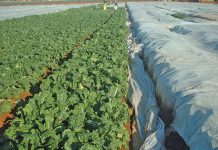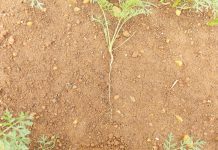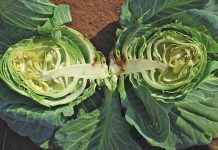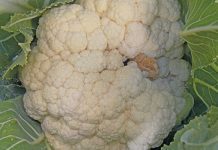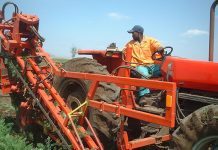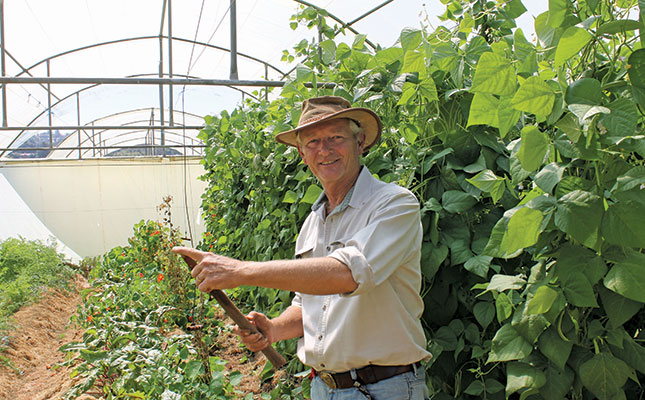
Photo: Pieter Dempsey
Geoffrey Green is a geographer-turned-farmer with a passion for organic farming in the city, an enterprise he runs from Sparrow Village Farm, in Maraisburg, west of Johannesburg. Although he has a mere 0,4ha at his disposal, he has utilised the space optimally and today grows up to 36 different crops, including sweetcorn, butternut, horned cucumber, cabbage, and cauliflower.
While still a geographer, Geoffrey worked on a project that examined the food supply chain. This stirred in him an interest for farming, which later found expression in a new career as an organic urban farmer. This venture was also inspired in part by concern over the distance that food must be transported from the rural farm to the urban fork.
As a geographer, he was well aware of the impact of climate change on farming conditions, and says that transporting food over long distances produces a large carbon footprint. His solution? Farm closer to the city.
“I did some research and found that on a 5m x 5m piece of ground, you can grow enough food to feed a family,” Geoffrey recalls. “I found this farm and my agreement with the landowner was that my first point of supply was to the orphanage next door– and I’ve proven that farming on a small scale can feed 150 people a day.”
Organic farming in the city
Composting is one of the primary activities on Sparrow Village Farm. Geoffrey ensures that not a single scrap of plant material goes to waste – everything gets composted.
“All the fertilisers I use are natural composted materials supplemented with worm tea and compost from the vermiculture bins,” he explains. The worm tea, diluted to a ratio of 1:20 with water, is applied approximately once a fortnight. Any leftover tea is poured onto the compost heaps.
He also makes his own chemical-free pesticides using garlic, khakibos and cayenne pepper. The garlic and cayenne pepper solution involves crushing two heads of fresh garlic and putting this into a 20l barrel of water for two hours. Two tablespoons of cayenne pepper are added to the water and left to dissolve for four hours.
“If there are no visible signs of insects on the plants, I don’t always add cayenne pepper,” says Geoffrey. To make the khakibos solution, he fills a 210l drum with khakibos, covers this with water and lets it stand for 10 days or until the mixture has turned a dark colour. The khakibos is then removed and the infused liquid is applied to plants.
“Both treatments are put through a sieve before application and applied using a handheld sprayer,” he explains. “The garlic solution is made every Wednesday and applied on a Friday afternoon. I only use the khakibos solution about once a month. The thinking is that by switching between the two treatments, it’ll take longer before the insects become resistant to either one.”
According to Geoffrey, healthy produce relies on healthy soil, and he utilises various methods to keep his soil fertile for his organic farming in the city.
To check the quality of his soil he will, for example, insert a yardstick into the earth to check the compaction level. “It all comes down to soil quality, maintaining a healthy ecosystem and creating biodiversity in the soil and plants.”
No-till and crop rotation
All Geoffrey’s organic crops are grown under cover in five 6m x 12m and two 10m x 30m tunnels. “I practise intercropping with several different plants such as ginger, garlic and onions for pest control. We also intercrop basil with the tomatoes and peppers, because the insects that like them don’t like basil,” he says. “I estimate that if we could maximise our efforts, we could probably produce 20t per harvest cycle.”
Geoffrey practises no-till and follows a rotation cycle that starts with mustard to produce green mulch, which is worked back into the soil. This is followed by tomato, beans and carrots, and then, after a fallow period, vegetables such as beetroot and kale.
“We use drip irrigation from a borehole, but because the soil has so much organic matter in it, we irrigate for only 40 minutes a day.”
In addition to crops, Sparrow Village Farm also has free-range chickens, with a breeding flock of about 40 hens and eight roosters. Birds are sent for slaughter at about 1,8kg, which is at approximately 10 weeks.
Out of touch
According to Geoffrey, there is a disconnect between people and their food. “Ask children living in cities today where milk or meat comes from and they’ll say it comes from the supermarket.”
He says that as a small-scale, organic farmer he has encountered reluctance from supermarkets to buy food with any imperfections, and consumers too expect produce to be perfect in shape, size and appearance.
“To limit wastage, the imperfect produce get used in products such as sauces or frozen vegetables. But it still means consumers are unaware of the realities that farmers deal with – not every tomato is free of marks on its skin.”
He adds that today’s customers prefer convenience, and want vegetables that have already been washed, chopped and packaged. Although this may make life easier, it adds to the disconnect between people and food, according to Geoffrey. People don’t know where their food comes from; they don’t understand the food system and many do not think about the consequences their food choices have on farmers and the environment, and thus organic farming in the city.
Phone Geoffrey Green on 082 601 4693 or email [email protected].
This article was originally published in the 06 May 2016 issue of Farmer’s Weekly.

